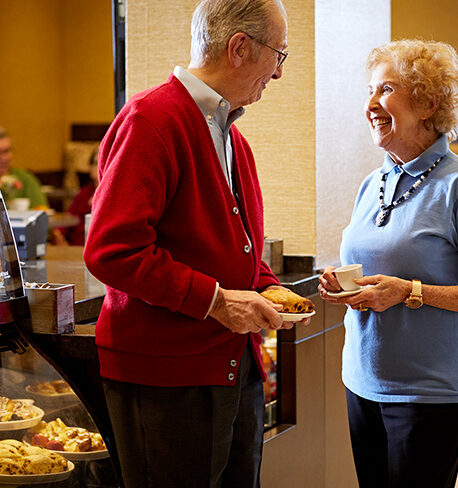As America continues its love affair with dining out at restaurants, there’s no reason a senior with Alzheimer’s has to be left behind. Here’s how to include a senior loved one who has memory problems in your dining plans so they feel relaxed and at ease.
Where You Choose to Dine Matters
The best thing you can do for your senior loved one when dining out is to choose your restaurant wisely. That entails a little research before you go, but the effort will be worth it in several ways.
First, consider what makes your loved one upset and let that determine your choice of venue for the dining out experience.
Experts at the Murray Alzheimer Research and Education Program at the University of Waterloo suggest picking a small, quiet restaurant with few distractions. Crowded, busy places present too many distractions that can be distressing and lead to agitation for someone with Alzheimer’s.
Pre-Test the Menu
A small, quiet restaurant is a good start, but you’ll also want to research the menu. Just as a crowded location is confusing and overwhelming, a crowded, busy menu presents the same confused and overwhelmed feeling for people with dementia.
Limited menus are good. If you’ve ever dined out with someone who has Alzheimer’s, you may have noticed something peculiar about the way they order. Very often, when they’re presented with a confusing menu, they’ll simply give up and order whatever the person sitting next to them ordered.
Whether it’s because they have trouble remembering what they like, or they can’t recall what they chose from the menu, they’re embarrassed to reveal their problems. So they decide ordering what someone else is getting is the safest bet.
If the restaurant has a website, as many do these days, review the menu with your senior loved one at home. You can both decide what to order before you even get to the restaurant!
Reservations are in Order, Too
Anything that removes the uncertainty from the dining out experience will help. On that note, it’s a good idea to make a reservation.
The experts at the Murray Program also suggest that when you call, it’s a good idea to notify the hostess about your loved one’s memory problems. They may be better able to serve you and generally make the dining experience more pleasant for your loved one when they understand the challenges.
Try to Find a Familiar Environment
Your loved one, if he or she has memory issues, probably doesn’t like surprises. That translates to favoring known places over new environments. An old familiar restaurant can be comforting. Your loved one may even recognize menu items, making the outing go much better.
Stay Up-to-Date on What Your Loved One Likes to Eat
When people with dementia go to meals, even in everyday situations, they may face confusion and frustration simply because their tastes are changing. According to the National Institutes of Health, they may be dealing with diminishing senses of taste and smell, which as we all know, dramatically changes the experience of eating. Make sure the restaurant you have in mind for this outing serves food that your loved one likes.
Everything we’ve covered here is based on scientific observation as reported by reputable institutions. But only you know your loved one’s preferences and the progression of his or her disease. Use common sense, keep it simple, and do everything you can to promote comfort and ease while dining out with your senior loved one who has Alzheimer’s.
Have questions about Alzheimer’s care? Contact the Five Star Senior Living community closest to you for more information and to schedule a tour of our Bridge to Rediscovery program.
Contact Us Today
"*" indicates required fields

